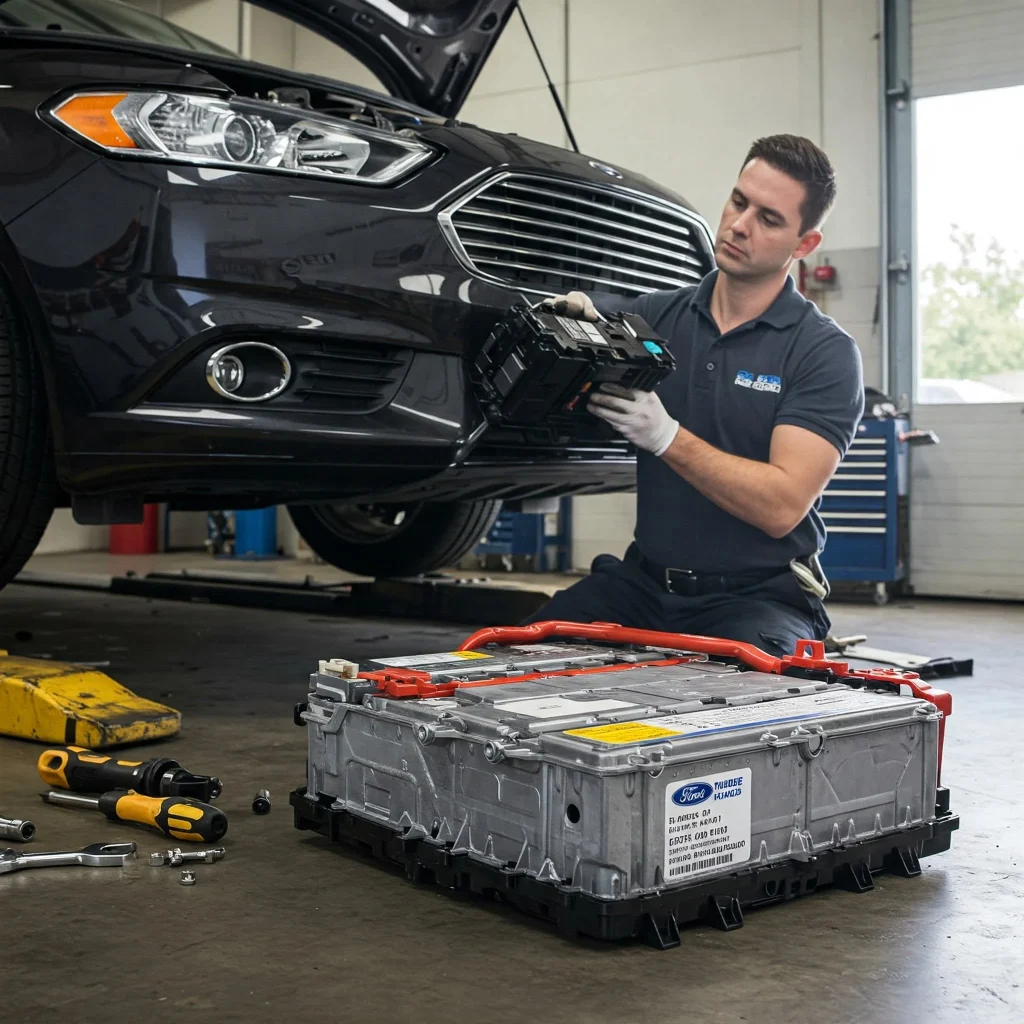Ford Fusion Hybrid Battery Replacement Cost Breakdown
The Ford Fusion Hybrid has carved out a niche as a reliable and eco-friendly sedan, loved for its smooth drive and fuel efficiency. But like all hybrid vehicles, one key component can make or break its longevity: the hybrid battery. This sophisticated power source is the heart of the vehicle’s hybrid system—and when it begins to fail, the cost of replacement can come as a shock.
In this detailed guide, we’ll break down the Ford Fusion Hybrid battery replacement cost, explore the various factors that influence the pricing, compare professional vs. DIY replacement options, and share essential tips on how to extend your battery’s life and potentially save thousands in the long run.

Understanding the Ford Fusion Hybrid Battery
What Is a Hybrid Battery?
A hybrid battery is a high-voltage battery pack that works alongside the internal combustion engine to power the vehicle. It stores energy generated during braking and deceleration, which is then used to assist in acceleration and reduce fuel consumption.
Battery Lifespan
Typically, a Ford Fusion Hybrid battery lasts between 8 to 10 years or approximately 100,000 to 150,000 miles. However, factors such as driving habits, climate, and maintenance can influence its longevity.
Cost of Replacing a Ford Fusion Hybrid Battery
Average Replacement Costs
The cost to replace a Ford Fusion Hybrid battery can vary widely based on several factors, including the model year, location, and whether you choose an OEM or aftermarket battery. Here’s a general breakdown:
- 2010–2012 Models: $1,800 – $3,500
- 2013–2015 Models: $1,900 – $3,500
- 2016–2019 Models: $2,000 – $4,000
- 2013–2018 Energi Plug-In Models: $4,900 – $6,900
These prices often include the battery itself but may not cover labor costs, which can range from $500 to $1,500 depending on the service provider.
Factors Influencing Cost
Several elements can affect the total cost of battery replacement:
- Battery Type: Newer models use lithium-ion batteries, which are more expensive than the nickel-metal hydride batteries found in older models.
- Labor Charges: Dealerships typically charge more for labor compared to independent mechanics.
- Warranty Status: If your vehicle is still under warranty, the replacement may be covered, significantly reducing out-of-pocket expenses.
- Location: Prices can vary based on regional labor rates and parts availability.
Signs Your Hybrid Battery May Need Replacement
Being aware of the warning signs can help you address battery issues before they lead to more significant problems:
- Decreased Fuel Efficiency: A noticeable drop in miles per gallon can indicate battery degradation.
- Warning Lights: Illumination of the check engine or hybrid system warning lights on the dashboard.
- Reduced Performance: Sluggish acceleration or difficulty maintaining speed.
- Unusual Noises: Strange sounds coming from the battery area.
Replacement Options: OEM vs. Aftermarket
OEM Batteries
Original Equipment Manufacturer (OEM) batteries are made by Ford and are designed specifically for your vehicle. They often come with a warranty and are installed by certified technicians, ensuring compatibility and reliability.
Aftermarket Batteries
Aftermarket options can be more affordable and may include refurbished or remanufactured batteries. Companies like Best Hybrid Batteries and Ace Hybrid Group offer such alternatives, often with warranties ranging from 1 to 3 years. However, it’s crucial to ensure that these batteries meet quality standards and are compatible with your vehicle.
DIY vs. Professional Installation
DIY Installation
Some owners opt to replace the battery themselves to save on labor costs. While this can be cost-effective, it requires technical expertise and safety precautions due to the high-voltage nature of hybrid batteries.
Professional Installation
Having the battery replaced by professionals ensures proper handling and installation. Although more expensive, it reduces the risk of damage to the vehicle and potential safety hazards.
Warranty and Insurance Considerations
Ford typically offers an 8-year or 100,000-mile warranty on hybrid batteries. Some states, like California, extend this to 10 years or 150,000 miles. Before proceeding with a replacement, check if your vehicle is still under warranty.
Additionally, some insurance policies may cover battery replacement under certain conditions. It’s advisable to review your policy or consult with your insurance provider.
Tips to Extend Battery Life
- Regular Driving: Frequent use helps maintain battery health.
- Avoid Extreme Temperatures: Park in shaded areas during hot weather and garage your vehicle in cold climates.
- Scheduled Maintenance: Regular check-ups can identify potential issues early.
- Smooth Driving Habits: Gentle acceleration and braking can reduce strain on the battery.
Environmental Considerations
Proper disposal of old hybrid batteries is essential due to the hazardous materials they contain. Many service providers offer recycling programs, ensuring that batteries are disposed of responsibly.
Conclusion
Replacing the battery in your Ford Fusion Hybrid is a significant investment, but it’s essential for maintaining the vehicle’s performance and efficiency. By understanding the costs involved, recognizing the signs of battery degradation, and exploring your replacement options, you can make informed decisions that ensure the longevity of your vehicle.
If you have further questions or need assistance finding a reputable service provider, feel free to ask.